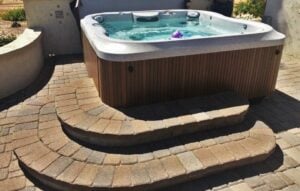If you are new to pool and spa ownership, the world of pool chemicals can feel overwhelming and complicated. The truth is, however, that it doesn’t have to be confusing. With advice from our professional partners at Blue Water Pool Chemical Company, Imagine Backyard Living can help simplify your regular care routine to keep your waters sparkling, refreshing, and inviting. Here is what you need to know:
Sanitizers
These chemicals do the heavy lifting when it comes to sanitizing and disinfecting your water to make your pool environment safe to swim in. Several popular options include:
- TriChlor Tabs or Sticks – Containing cyanuric acid. This form is easy to add to a chlorine floater or a chlorinator for easy dispersal.
- DiChlor Granular – A powdered form containing cyanuric acid, this type easily dissolves to act quickly.
- Bromine Tabs – An alternative chemical, bromine is better suited to hot water and is useful when treating hot tubs or spas.
- Cyanuric Acid – Available in a liquid or dry form, this chemical stabilizes and protects chlorine from UV rays.
Oxidizers
A secondary sanitizer, oxidizers are used less often compared to the sanitizers listed above but it is recommended to use one every few weeks to rid your pool of any algae or bacteria.
- Cal Hypo – Short for calcium hypochlorite, this pool shock is a great boost for chlorine and works best on water with a low pH reading.
- Chlorine Free Shock – A granular potassium monopersulfate, this type of shock uses an oxygen-based sanitizer.
- Lithium Shock – Another alternative shock treatment is a lithium hypochlorite treatment that dissolves quickly and renders water immediately swimmable.
Water Balancers
To keep your pools chemistry well adjusted, you should test for chlorine and pH as well as total alkalinity, calcium hardness, and cyanuric acid levels. Key chemicals include:
- pH Increaser/Reducer – Granular soda ask and granular sodium bisulfate can aid in attaining the correct pH levels.
- Alkalinity Increaser – If total alkalinity drops below 80ppm, an increaser is necessary to raise TA.
- Calcium Hardness Increaser – A granular calcium chloride will raise calcium hardness levels if they drop below 150ppm.
- Chlorine Neutralizer – If you face the problem of high chlorine levels, a granular sodium thiosulfate can help lower the free chlorine amount.
In addition to these mainstays, they are plenty of specialty chemicals on the market to help counter unexpected problems. If you find yourself in need of assistance, give us a call, as we’re happy to help troubleshoot or refer you to professionals who can solve your problems!









